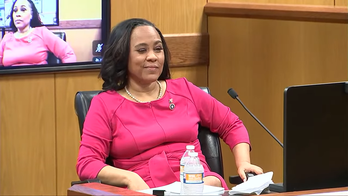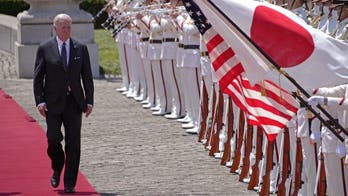Burst Bubble Still Splatters Home Market
"I am just going to swallow my pride and walk out. I have to. The market for homes is not going up."
-- Tasha McLaughlin, 33, of Sacramento, Calif. discussing with the Wall Street Journal her home, bought for $256,000 in 2004 and now worth less than $80,000.
There are too many foreclosures, or maybe not enough.
Three straight months of decline in housing prices has driven real estate prices nationally back to their lowest levels in the aftermath of the Panic of 2008.
The only exceptions to the trend were big cities in California, where values are rebounding after a localized recession last year, and metro Washington, a company town where business has been good.
The hardest hit are Atlanta, Miami, Seattle, Tampa, Charlotte, N.C., and Portland, Ore. Boom towns from the past decade like Las Vegas that went bust are still in the tank, but the expansion of housing woes to more stable areas suggests like the Pacific Northwest some serious structural problems.
This matters so much because a third of the $18 trillion in wealth held by Americans is tied up in the value of their homes. People who believe they are worth more, spend more. People who are worth less, spend less. Right now, millions of Baby Boomers counting on home equity as a retirement nest egg are pinching pennies.
While consumer spending for the Christmas season seems to have returned to pre-panic levels, consumer confidence is down, unemployment is steady and interest rates are creeping up, partly on inflation fears.
The concern is so great that Republicans are starting to rethink their plans to quickly spin down government support for the mortgage market. It also has some lawmakers calling for a return of the tax credit that juiced prices last year.
But the problem remains that the flow of foreclosures continues unstaunched. Some are new foreclosures spurred by continuing high unemployment but others are delayed actions, put off by either government loan modification programs or the recent controversy over how foreclosure notices were signed by bank officials. And beyond the homes actually in foreclosure are many more that should be, but where banks have opted to let owners remain and maintain the property.
The slow-moving foreclosure epidemic means that there is an ongoing drag on home prices. Economists who watch real estate say the “double dip” has arrived for their sector, and many in Washington fear that it could drag the rest of the economy down with it.
One of the reasons that the Obama administration has resisted calls from other Democrats to freeze foreclosures or make assistance to debtors in arrears more lavish is that slowing the foreclosure flood means lengthening and possibly worsening the poor housing market.
Tapes Reveal More Afghan Corruption
“The corruption went from the top to the bottom. It ran sideways to the Taliban. It went in every direction."
-- An American agent telling the Wall Street Journal about Afghan wiretaps.
In an effort to squeeze some reforms out of President Hamid Karzai’s government in Kabul, American sources have leaked discoveries of endemic corruption within his government.
The law enforcement and intelligence sources made the Wall Street Journal privy to the findings made during an extensive wiretapping effort begun last year to track sources of Taliban funding. It seems like the CIA had the whole country wired for sound.
The leaks focus on Haji Muhammad Rafi Azimi, a banker with deep ties to the Karzai claque, who is accused of bribing government officials and cutting side deals with the Taliban. After an Afghan anti-corruption squad brought charges against Azimi with American help, Karzai moved to have the charges thrown out.
Now, the entire anti-corruption effort seems to be in jeopardy as Karzai reshuffles his government and tightens his in inner circle in preparation for a reduced U.S. presence in the country. Part of that effort depends on forging a separate peace with some in the Taliban.
Meanwhile, military commanders are pointing to new lines of cooperation between previously factious groups of insurgents in Afghanistan and Pakistan. United by the common enemy of the United States, ethnically and tribally divided groups have begun working together says today’s New York Times.
While Americans and Brits have made advances in the Hellmand province in the southeast, new dangers are emerging as insurgents adapt to new allied tactics and increased manpower.
Maj. Gen. John Campbell, a rising star and the man in charge of the allied effort in the east, told the Times that unlike in winters past, many insurgents have stayed to fight through the cold weather months. While most winter in caves deep in the mountains, squads remain behind in the lowlands to harass Western forces.
Campbell projected a 15 to 20 percent increase in wintertime attacks.
Highway Cash Strains House GOP Unity
“The only thing that is propping up construction industry is the notion that there is a stable funding. If you make these changes now and open the possibility to reduce the amount of funding you are inserting uncertainty to the construction industry…”
-- Janet Kavinoky of the U.S. Chamber of Commerce to The Hill blasting a new Republican rule to limit transportation spending.
For those looking for the first big battle for the new House GOP, here it is.
The new rules adopted by the Republican leadership change make an important switch on the trust fund used to build and maintain highways. Lawmakers currently appropriate the money based on projections of revenue for the fund, provided by federal gas tax. If the fund comes up short, the obligations are met from general revenues.
Over the years, the fund has had to be bailed out three times to the tune of $35 billion.
The new rule is that the fund can only be obligated to projects for which it has funding, but that has business and labor groups up in arms saying that Team Boehner is ruining the hopes of long-range road projects. Big business and big labor are both lobbying hard to block the new rule.
Transportation appropriators often get around puny resources by committing the government to decade-long projects. And once the projects are underway and money has been spent, it’s harder to argue for cutting them off.
While GOP appropriators might have been willing to swallow an earmark ban, messing with road money is serious business. Boehner’s troops tell Power Play that they expected a fight all along and will stick it out, but opponents of the new rule will have some serious backing in their call for the status quo.
China Gets Carrier-Killer Missile, Expands Fleet
“Beijing has successfully developed, tested, and deployed the world’s first weapons system capable of targeting a moving carrier strike group from long-range, land-based mobile launchers.”
-- Andrew Erickson, an expert on the Chinese military at the US Naval War College, to the Financial Times.
Uh-oh.
The Pentagon has confirmed the existence of China’s newest tool in controlling Asian sea routes – a high tech missile system designed explicitly to sink big aircraft carriers far out at sea.
The only country that has a bunch of big aircraft carriers is America, and we have relied on them since the 1970s as our primary tool to project power around the globe.
Our 10 Nimitz Class aircraft carriers, a fifth of a mile long and capable of carrying 90 warplanes, are the heart of America’s military deterrent. The fast ships can rain holy hell down on any location in the globe, usually in a matter of hours.
The Chinese have developed their missile system with knowledge of that holy hell raining and mean to let the American military know that it will deploy the missile to gain an advantage in disputed waters like the Taiwan Strait.
It will take time for the system to be fully implemented, but the news is obviously alarming for the U.S. military.
This comes just after China quietly announced that it was laying down the keel of its own aircraft carrier, the beginning of what is promised to be a substantial fleet. The only purpose for aircraft carriers is to project power abroad, so China’s Asian neighbors have not taken too warmly to the news.
While the first Chinese carrier wouldn’t be able to go toe-to-toe with a Nimitz battle group or its successors in the Gerald Ford class, it would be enough to shift the balance of power in Asia decidedly in China’s favor.
Daniels Testing the Waters With Vigor
“You know, if it comes down to height and hair, I guess we won't… wouldn't do too well."
-- Gov. Mitch Daniels (R-IN) discussing his presidential possibilities with WANE in Ft. Wayne, Ind.
Mitch Daniels has been acting pretty froggy lately, and a longtime friend and adviser to the Indiana governor thinks it could be a sign that Daniels will jump in the race.
Daniels has been talking very frankly about his presidential chances and even defending his controversial call for a “truce” on social issues until the country has put its fiscal and economic house in order. Daniels has talked in recent days to the Associated Press, the Indianapolis Star and WANE television.
The Daniels associate tells Power Play that the governor is “obviously having fun” in the role of potential candidate and “wouldn’t be at all surprised” to see him make a try.
The socially conservative Daniels has been working to put in context his call for a cease-fire in the culture wars. His answer is to explain that the current debt, tax and economic problems facing the country are medium-term threats to national survival, while cultural issues can be addressed on a longer timetable.
It may not wash with some cultural conservatives in the GOP, who might gravitate to Mike Huckabee, but it may be enough to get Daniels a second hearing from many undecided GOPers.
The big test would be financial.
Daniels has said he won’t announce any decision until after the state’s upcoming spring legislative session, but since he lacks any national organization, that would put Daniels way behind others, like fellow fiscal hawk and lame duck Gov. Tim Pawlenty, in organization.
Daniels’ friend said that the governor wouldn’t mount a long shot effort in the face of “impossible odds,” but that right now “the field looks wide open.”
And Now, A Word From Charles
“They're totally out of control. It's a reason FDR never allowed the government workers to unionize. He understood that any negotiation between a government worker and the bosses is not like private-sector negotiation where the boss' livelihood is at stake if he negotiates badly.”
-- Charles Krauthammer on “Special Report with Bret Baier” discussing public employee unions.




